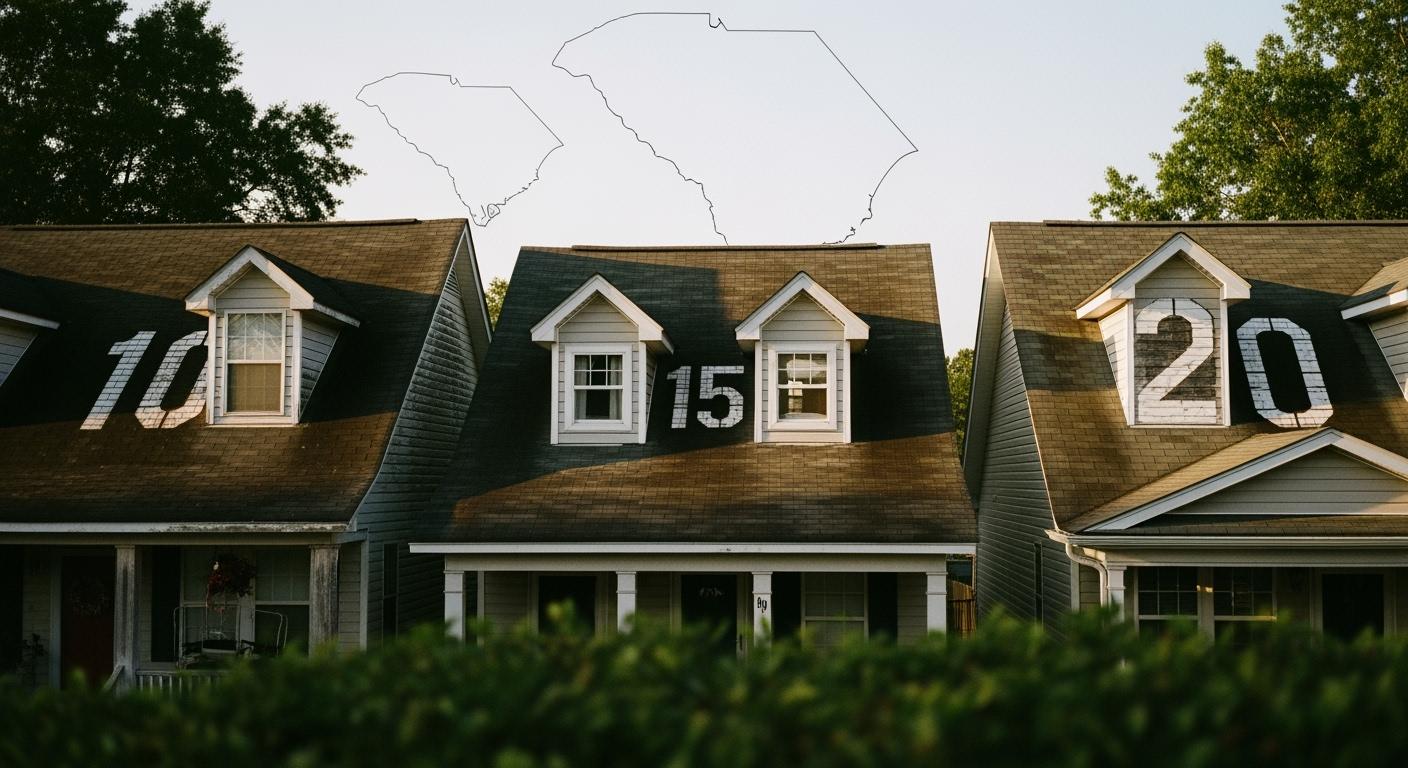
Imagine you live in Bluffton and get a renewal notice for your home insurance. Your agent asks about your roof’s age. Roof age rules decide if your coverage stays the same or changes in SC & GA.
TL;DR: Your roof’s age can affect your insurance rates and claim payouts. Knowing the key milestones helps you protect your home and wallet.
You want clear answers, not insurance jargon. This guide breaks down what you need to know about your roof and your coverage.
Key Takeaways
Learn when your roof gets older. Roofs at 10, 15, and 20 years can change your insurance and costs.
Collect papers about your roof. Pictures, inspection notes, and repair records show your roof’s shape to insurance companies.
Know what Actual Cash Value and Replacement Cost Value mean. Old roofs often get less money back, which can hurt your budget.
Check and fix your roof often. This helps you avoid paying more and keeps your insurance safe.
Look for deals on FORTIFIED roofs. Making your roof better can save you money and give you more insurance choices.
Roof Age Rules and Your Coverage
Key Milestones: 10, 15, and 20 Years
It is important to know your roof’s age milestones. Insurance companies in South Carolina and Georgia use 10, 15, and 20 years as big points. These roof age rules decide if you keep your coverage or if it changes.
Here is a table that shows how these milestones affect your coverage:
Roof Age (Years) | Premium Impact | Coverage Eligibility | Claim Settlement (ACV vs RCV) | Inspection/Documentation Needed |
|---|---|---|---|---|
10 | Lower premiums; newer roof status | Most carriers offer full coverage | Replacement Cost Value (RCV) likely | Basic proof of age |
15 | Premiums may increase; stricter underwriting | Some carriers limit coverage | May shift to Actual Cash Value (ACV) | Inspection often required |
20 | Highest premiums or possible denial | Coverage may be restricted or non-renewed | ACV only or removal costs covered | Detailed inspection, maintenance records |
Many insurance companies now want shingle roofs replaced after 7 years. If your roof is older than 20 years, some companies pay only the actual cash value or removal costs. You may need to show records of roof care to keep your coverage.
Why Roof Age Matters to Insurers
Insurance companies care about roof age because old roofs have more problems. As roofs get older, leaks and storm damage happen more often. In the southeast, homes with bad roofs cost 60% more in losses. Insurers use aerial photos and computers to check roof age very well. They also study how roofs age in local weather, like the IBHS Roof Aging Farm Research in South Carolina.
When your roof turns 15 years old, your insurer may ask for an inspection before renewal. If your roof is over 20 years old, you could lose your home insurance or pay much higher premiums. These roof age rules help insurers manage risk and keep costs fair for everyone.
Tip: If your roof is close to a milestone, gather photos and maintenance records now. This helps you prove your roof’s condition and keep your coverage.
Local Example:
A Bluffton homeowner had a 17-year-old roof. At renewal, the insurer asked for a full inspection. The inspection found worn shingles, so the company changed the policy to actual cash value for roof claims. The homeowner paid a higher premium and got less money for a later storm claim. This shows how roof age rules can change your coverage and costs in Beaufort County.
Home Insurance Coverage Changes with Roof Age

ACV vs RCV for Older Roofs
Your roof’s age can change how your insurance pays for damage. When your roof is new, most policies use Replacement Cost Value (RCV). This means you get enough money to replace your roof. You do not lose money because of age or wear. As your roof gets older, especially after 15 years, many companies switch to Actual Cash Value (ACV). ACV pays you the value of your roof after taking away depreciation. You may get less money for repairs or replacement.
Pull Quote:
“For roofs over 15 years old, most SC & GA homeowners receive ACV payouts, which often leave you paying more out-of-pocket for repairs.”
Here is a table showing the difference between ACV and RCV for older roofs in Georgia:
Coverage Type | Description | Impact on Payouts |
|---|---|---|
Actual Cash Value (ACV) | Depreciation deducted based on roof age | Lower payouts for older roofs, often requiring out-of-pocket expenses |
Replacement Cost Value (RCV) | Full replacement cost without depreciation | Higher payouts, but may not apply for roofs over 15 years old |
Insurance companies decide if they offer ACV or RCV based on your roof’s age and condition. They look at repair costs and fair market value. Sometimes, they use the broad evidence rule. You should check your policy to see which method applies to your home.
Endorsements and Exclusions
As your roof gets older, your policy may change in other ways. Some companies add endorsements or exclusions. Endorsements can give you extra protection, like discounts for FORTIFIED roofs. Exclusions may limit or remove coverage for older roofs. In Georgia, you can get discounts for FORTIFIED construction through the Georgia Underwriting Association. In South Carolina, 17 insurers offer FORTIFIED discounts. Some save you over 50%.
Here is a table showing how endorsements and discounts work in SC & GA:
State | Endorsements and Discounts |
|---|---|
Georgia | The Georgia Underwriting Association gives insurance discounts for FORTIFIED construction and explains how to qualify. |
South Carolina | A 2016 survey found 17 insurers giving FORTIFIED discounts, with some offering savings of over 50%. |
Your deductible and premium may also change as your roof ages. Many companies raise rates by 30% to 40% for older roofs. About 75% of companies will not insure roofs older than 10 years. Some require a secondary water resistance layer for roofs over 15 years old.
Policy Change Type | Description |
|---|---|
Rate Increase | |
Coverage Limitations | 75% of companies will not insure roofs older than 10 years |
Additional Requirements | Some companies need a secondary water resistance layer for roofs over 15 years old |
Local Example: Buford/Gwinnett
You can see the impact of age in real claims. A Buford homeowner with a 12-year-old roof got a full settlement of $22,500 for roof replacement after a hailstorm. They only paid their $2,500 deductible. Another homeowner in Gwinnett with a 20-year-old roof got just $8,000 in actual cash value coverage. They had to pay $15,000 out-of-pocket to replace the roof. This shows how roof age rules affect your coverage and costs.
Get a Free Roof-Age Coverage Check
🏠 Worried about your roof’s age?
Get a free Roof-Age Coverage Check from GSP Insurance Group.
Find out if your policy covers full replacement or only ACV.
Request your free coverage check now.
You should review your policy every year. Check your roof’s age and condition. Ask your agent about endorsements, exclusions, and deductible changes. This helps you protect your home and budget.
Local Factors Impacting Roof Lifespan

Climate and Building Codes
The weather in your area can make roofs wear out faster. South Carolina and Georgia have hot summers and lots of humidity. These things make roofing materials break down quicker than in other places. Hurricanes, heavy rain, and strong winds also hurt roofs. This is a big problem in towns like Bluffton and Buford. Asphalt shingles last 15 to 30 years in Georgia. In South Carolina, people often replace them after 20 to 30 years. Metal and slate roofs last much longer.
Here is a table showing average roof lifespans by material:
Roofing Material | Average Lifespan in Georgia |
|---|---|
Asphalt Shingles | 15–30 years |
Metal Roofing | 40–70+ years |
Clay/Concrete Tiles | 50+ years |
Wood Shakes/Shingles | 15–30 years |
Slate Roofing | 75–100+ years |
Building codes help decide how long your roof lasts. They also affect your insurance. In South Carolina, contractors must follow strict rules and get permits for big jobs. Georgia makes you follow local codes and rules R905.2 and R903 from the IRC. You need a permit for roof work in counties like Gwinnett and Beaufort. If you skip these steps, you could get fined or lose coverage.
For more details, check IBHS FORTIFIED and Georgia Dept. of Insurance.
Storms and Roof Maintenance
Storms cause lots of damage to homes in SC and GA. Wind and hail storms happen a lot. From 2018 to 2022, one in 35 homes made a wind or hail claim. In 2022, these storms caused 40.7% of all insurance claims. The average payout was $13,511. If your roof is old, your coverage may only pay actual cash value after a storm.
You can make your roof last longer with regular care. Check your roof often. Fix problems right away. Use tips from the IBHS FORTIFIED program to make your roof stronger. Good care helps you keep coverage and avoid expensive repairs.
Tip: Get your roof checked before storm season. Keep records of repairs and upgrades. This helps you follow roof age rules and protect your coverage.
What Homeowners Should Do Before Renewal
Preparing Documentation
You need good records before your insurance renewal. Strong proof helps you keep coverage and might lower costs. Insurers in Bluffton, Beaufort, Buford, and Gwinnett want to see that you care for your roof. You should collect photos, inspection reports, and invoices. These things show your roof’s condition and repairs.
Here is a checklist to help you get ready:
Take clear photos of your roof before and after storms.
Save inspection reports from licensed contractors.
Keep estimates for repairs or replacement.
Store receipts from emergency fixes.
Gather records of maintenance and upgrades.
Type of Evidence | Description |
|---|---|
Photos of the roof | Pictures before and after storms are important. |
Written inspection reports | Details from roof inspections by professionals. |
Estimates for repair or replacement | Costs for repairs or new roofs. |
Receipts or invoices from emergency fixes | Proof of urgent repairs made. |
You can find more tips in our GSP Homeowners Insurance guide and our blog about wind and hail coverage.
Maintenance Tips
Taking care of your roof helps you keep coverage and avoid claim problems. You should get a professional roof inspection every year. If you had storm damage, get another inspection. Fix small problems before they get worse. Always keep records of repairs and upgrades.
Roofing contractors in SC & GA suggest these steps:
Get regular roof inspections by professionals.
Fix small issues right away.
Keep records of all repairs and maintenance.
Maintenance Tip | Description |
|---|---|
Regular Inspections | Check your roof often to find small problems early. |
Documentation | Save records of repairs and maintenance for claims. |
Prompt Repairs | Fix problems quickly to stop bigger issues. |
You can read more about roof care in our roof claims and maintenance tips blog.
Ready to compare your coverage options?
Request a Quote to compare coverage options with GSP Insurance Group.
Roof age rules decide your insurance in Bluffton, Beaufort, Buford, and Gwinnett. You need to know your roof’s age milestones. Check your policy often. Keep records of inspections and repairs. In SC & GA, insurance companies want roofs replaced after 20 years. They may change to ACV coverage for older roofs. Taking care of your roof helps you avoid losing coverage and paying more.
Look at your insurance policy every year.
Take photos and save reports about your roof.
Ask a local expert for help.
Coverage is different for each company and state. The details here are general and do not guarantee coverage. Read your policy papers and talk to a licensed advisor.
A Partner for Your Journey.
Request a Quote with GSP Insurance Group — A Partner for Your Journey.
FAQ
How do roof age rules affect my home insurance in SC & GA?
Roof age rules decide if you get full replacement cost or actual cash value for claims. If your roof is older than 15 or 20 years, your insurer may limit coverage or raise your premium.
What is the difference between ACV and RCV for roof claims?
RCV pays to replace your roof with new materials. ACV pays the value of your roof after subtracting depreciation. Older roofs in Bluffton or Buford often get ACV payouts.
Can I get a discount for a FORTIFIED roof in Georgia or South Carolina?
Yes! Many insurers offer discounts for FORTIFIED roofs. You can save money and improve your coverage by upgrading your roof to meet FORTIFIED standards.
What documents should I keep for my roof insurance renewal?
You should keep photos, inspection reports, repair invoices, and maintenance records. These documents help you prove your roof’s condition to your insurer in Beaufort or Gwinnett.
Will my insurance drop me if my roof is over 20 years old?
Some companies may not renew your policy if your roof is over 20 years old. You should check your policy and talk to your agent about your options as a SC & GA homeowner.
